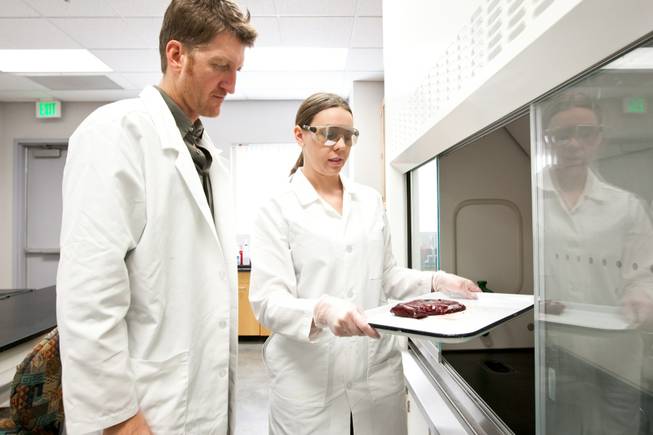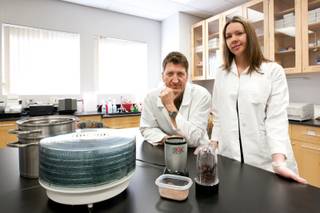
Mona Shield Payne
Dr. Daniel Benyshek and graduate student Sharon Young examine the condition of a donated placenta as they continue their research on placentophagy in the Metabolism, Anthropometry and Nutrition lab at UNLV in Las Vegas February 22, 2013.
Friday, March 1, 2013 | 2 a.m.
The growing practice of women consuming their placenta has caught the attention of two UNLV researchers, who this week published the first experiential study on human placentophagia.
The report, published Wednesday in the Ecology, Food and Nutrition journal, outlines a mother's motivations behind and experience with consuming their placenta.
UNLV anthropology professor Daniel Benyshek and graduate assistant Sharon Young became interested in placentophagia after meeting North Las Vegas mother and advocate Jodi Selander at a campus event.
Selander helped the UNLV researchers find survey respondents through her extensive network of placenta specialists. Although Selander co-authored the study, she did not analyze the data.
Researchers surveyed 189 women engaging in placentophagy about their consumption habits and reactions. The majority of survey respondents were from the United States, but there were a few women from Canada, Australia, Singapore and the United Kingdom.
The women in the study were overwhelmingly white, married, college-educated and were solidly middle- to upper-middle class. Most of the women had home births.
The majority of the women in the survey engaged in placentophagy once, and steam-cooked their placenta before turning the placenta into pills.
However, as women had more children, they were more likely to experiment with other preparation methods, such as dehydrating raw placenta before encapsulation. A small number of women cooked their placenta into food, or ate it raw.
Most women said they engaged in placentophagy to improve their mood and improve lactation. Many said the practice was recommended to them by their midwife or an advocate of the practice.
Overall, 96 percent of the women said they had a “positive” or “very positive” experience consuming their placenta, and 98 percent said they would do it again.
In recent years, placentophagy has come out from the shadows of the home-birth movement, embraced by celebrities like January Jones and hyped in popular media. Las Vegas resident Holly Madison, former reality television star and Strip headliner, recently blogged on Celebuzz, “This might sound gross, but I’m totally planning on having my placenta turned into pills I can take after giving birth. I heard it helps women recover faster and I want to recover as quickly as I can!”
However, the practice has its skeptics who point to a wide range of negative side effects, including headaches and upset stomachs. Other critics have argued the placenta pills have no positive or negative effects.
About 57 percent of women in UNLV’s study reported no negative effects from ingesting placenta. The most commonly reported negative experience revolved around the pill's taste and the "ick" factor of consuming placenta.
Ultimately, UNLV researchers hope to resolve this debate by conducting the world's first definitive study on the effectiveness of placenta pills — a sort of placebo versus placenta study.
To that end, Benyshek and Young are analyzing the nutrient and hormone content of the human placenta and testing the best ways to prepare it for human consumption. Eventually, they hope to discover what, if anything, makes the placenta so potent a remedy for the baby blues, and whether there are any risks involved.
"We hope to have some empirical data that can actually inform what sort of effects human placenta can have," Benyshek said. "It may in fact be that there are benefits and risks we don't know about. Maybe it's benign. Any of these are possible."
UNLV Study Highlights
- UNLV researchers surveyed 189 women who had ingested their placenta after the birth of at least one child. The survey was conducted between October and November of 2010.
- Demographics of survey respondents:
- • 91 percent were from the U.S.
- • 93 percent were white
- • 90 percent were married
- • 58 percent reported a household income over $50,000 a year
- Top positive self-reported effects of placentophagy:
- • Improved mood
- • Increased energy
- • Improved lactation
- Top negative self-reported side effects of placentophagy:
- • Unpleasant burping
- • Headaches
- • Unappealing taste or smell


Join the Discussion:
Check this out for a full explanation of our conversion to the LiveFyre commenting system and instructions on how to sign up for an account.
Full comments policy